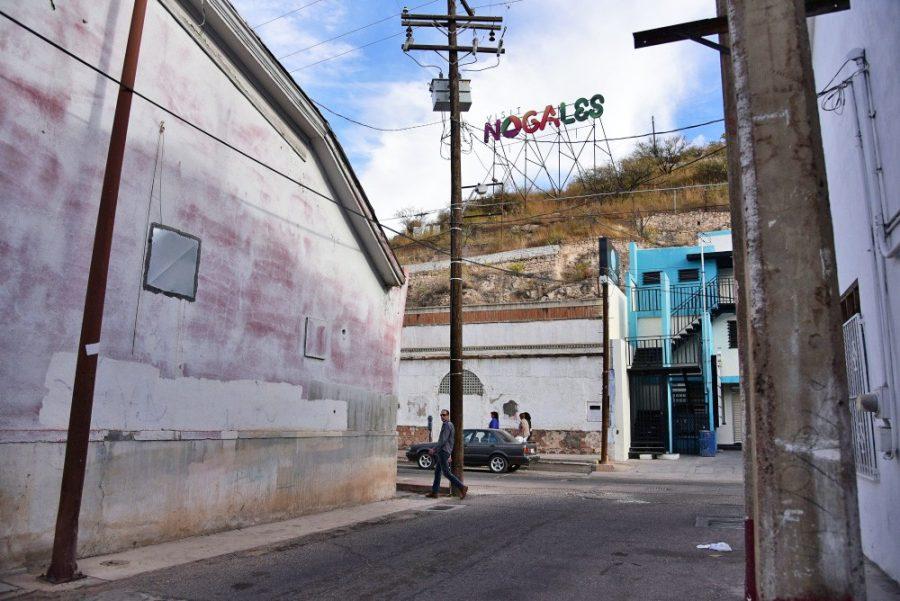Living in a city that straddles two countries is an interesting experience. My hometown of Nogales, Arizona allows me to enrich my life with the cultures of two different nations along with the Sonoran city that shares its name.
The population of Nogales, Arizona is around 20,000 people. Nogales, Sonora has a population of around 200,000. The streets in Sonora were full of life every time I visited, which prepared me for a life in the city of Tucson, which is more than double this size where I now attend college at the UA.
Being born in a border town allowed me to learn the complex history of these two countries from my mother, who is a first generation citizen, and my Nana, who immigrated to Arizona from Mexico. Like most immigrants, my Nana sought a better future for herself and her family, so she left her home country at the age when I was deciding on which college I wanted to attend.
RELATED: DREAMers look for sanctuary at UA
Now that I live in Tucson, I travel frequently to Nogales to visit my family. I spend my breaks from school reconnecting with my roots and recharging my batteries in the town where I was raised.
Traveling to Nogales seemed a lot less complicated when I first moved to Tucson. During my first year here, I would travel back to Nogales every other weekend. But the further I progressed in my academic career, the less frequently I visited. This past semester I only visited Nogales once for a few days during spring break.
The expense of traveling back and forth wasn’t cheap, and this was added to the workload that school demands of a student. These factors didn’t allow me to balance well between my life in Tucson and my life in Nogales.
Some of my best memories are in either Nogales, Arizona or Nogales, Sonora. No matter how hard I try to make my apartment in Tucson feel more like home, it won’t be. For me, home is where my family is. It’s the smell of the monsoon, it’s the summers filled with raspados. Home is Nogales and for me it always will be.

As a child, crossing the border into Sonora meant going to a nice restaurant, visiting various shops, riding the burro, getting my picture taken and, if I behaved, getting to take a toy home with me.
Being in Sonora made me aware of where I lived. The vibrant and beautiful Mexican culture that filled my home came from there.
As an adult, crossing the border doesn’t feel the same. I go to Mexico for vacations and to spend time with family and friends.
When I was younger, I never felt like there was any tension or judgement when I would cross the border into Sonora or cross back into Arizona. However, in recent times, the toxic nature and unpleasant manner with which travelers are treated is extreme.
RELATED: Column: U.S.-Mexico border sees fewer arrests, despite President Trump taking no action
Immigrants are so much more than the stigmas that surround them; they are people just like you and I. They have their own stories, hopes, dreams and souls. But unfortunately, the culture of this day and age has leaned toward intolerance instead of empathy.
Looking back, I have an immense respect for my grandmother. She left her home country as a teenager and created new roots here in the U.S. because she wanted a brighter future. She came to this country legally and she contributed to society for more than 60 years, all the while never being a citizen of the U.S.

Everyone wants the best possible future for their children, and my grandmother and mother were no exception to that. I believe that the U.S. should be more accessible. I believe that everyone should have the opportunity for a better life, yet not everyone gets that chance.
I refuse to accept the hostility presented by those in power towards immigrants. Many parents work extremely hard to try and give their children a better chance at a prosperous life, regardless of which side of the border they reside. My Nana was one of those people, she wanted a better life for her children, and luckily she was able to accomplish that.
Nogales will always be such a big part of who I am. I may not visit as often as I used to, but that town is who I am. No place will ever feel more like home than Nogales. It is my roots, my history, my identity and my family; I’m so thankful to have been born there. No matter where I live, Nogales will always be with me.
Follow David Pujol on Twitter.









